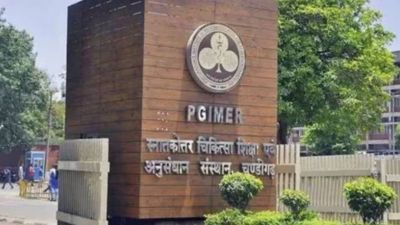Budget Session: LS polls on mind, Cong govt not to table Bill against anti-conversion law
The anti-conversion Act is largely modelled on laws that are in existence in UP, Gujarat, Madhya Pradesh and Himachal Pradesh.
 Karnataka Chief Minister Siddaramaiah
Karnataka Chief Minister Siddaramaiah The Congress government in Karnataka has decided against tabling a Bill for repealing the controversial anti-conversion law, passed by the previous BJP-led state government, in the ongoing Budget Session of the state legislature despite a Cabinet decision on it on June 15.
“The Bill is not likely to be tabled in the current session,” an official attached to the office of Karnataka Chief Minister Siddaramaiah said. Sources in the state legislature said a draft Bill prepared a few days ago and set for printing had been withdrawn by the government.
On June 15, the state Cabinet had taken a decision to repeal the Karnataka Protection of Right to Freedom of Religion Act, 2022. State Law Minister H K Patil had said after the Cabinet meeting that a decision had been taken to repeal the Act in the July session of the legislature.
Sources in the law ministry said the state government has now decided to keep in abeyance all controversial laws passed by the previous BJP government, including the anti-conversion law and the ban on cattle slaughter, until the conclusion of the Lok Sabha polls next year in order to prevent the BJP from holding protests over the issue and gaining political mileage ahead of the elections.
The Karnataka Protection of Right to Freedom of Religion Bill was passed in September 2022 despite protests by Opposition parties and minority groups. The law restricts religious conversion and regulates interfaith marriages. Commonly referred to as the anti-conversion Act, the law prohibits conversion from one religion to another by misrepresentation, force, fraud, allurement or marriage.
“No person shall convert or attempt to convert either directly or otherwise any other person from one religion to another by use of misrepresentation, force, undue influence, coercion, allurement or by any fraudulent means or by marriage, nor shall any person abet or conspire for conversions,” says the Act.
The anti-conversion Act is largely modeled on laws that are in existence in UP, Gujarat, Madhya Pradesh and Himachal Pradesh. Like the UP unlawful conversion law, the Karnataka “right to freedom of religion’ law addresses the right-wing concerns over “love jihad” by seeking to regulate interfaith marriages.
According to the law, marriages where religious conversions have taken place for the convenience of marriage will have legal recognition only if the conversion has been brought to the notice of a district magistrate 30 days in advance and 30 days post-conversion.
A jail term of three year to five years, and a fine of Rs 25,000 has been proposed for people from general categories violating the law. For people converting minors, women and persons from the SC and ST communities, the jail term is from three to 10 years, with a fine of Rs 50,000.
The Congress had opposed the law on the grounds that it was “unconstitutional” and “against the right to freedom of religion” that is enshrined in the Constitution.
The Congress is yet to decide on bringing changes in the Karnataka Prevention of Slaughter and Preservation of Cattle Bill, 2020, which bans the slaughter of all cattle. The government is under pressure from farmer groups to change the cattle slaughter law on account of a promise in its election manifesto to reverse laws hurting farmers in the state.
The Congress is set to restrict itself in the current legislature session to changing a farm produce marketing law of the previous BJP government, which allows the sale of farm products outside APMC markets.
The Karnataka Agricultural Produce Marketing (Regulation and Development) (Amendment) Act, 2023, which was introduced last week by Agricultural Marketing Minister Shivanand Patil, seeks to return the state to a regime where the sale of all agricultural produce must occur through the markets of the agricultural produce marketing co-operatives. The Bill is yet to be passed in the Assembly.
A delegation of farmer leaders met CM Siddaramaiah on Monday with a plea to push ahead with changing anti-farmer laws from the BJP regime. “The government will take a firm decision on the anti-farmer agricultural laws implemented by the BJP government,” Siddaramaiah told the delegation.
- 01
- 02
- 03
- 04
- 05































